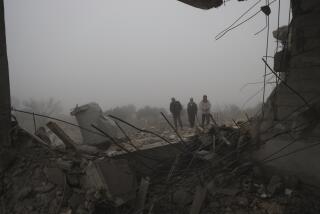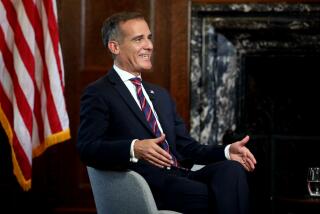Egyptian Envoy’s Abduction Heightens Fear in Baghdad
- Share via
BAGHDAD — The kidnapping of Egypt’s top envoy in Baghdad has sent shivers through the capital’s small diplomatic community and may further hamper Iraq’s drive to restore full diplomatic relations with the world.
Ihab Sherif was abducted as he drove between his home and a store Saturday night, and there was no new information Monday about his whereabouts or any claim of responsibility for his disappearance.
Sherif, head of Egypt’s diplomatic mission in Baghdad, was set to become a full-fledged ambassador, the first from an Arab country since the U.S.-led invasion in March 2003.
U.S. and Iraqi government officials have accused Arab nations, most of which are predominantly Sunni Muslim, of refusing to restore full diplomatic ties with Iraq because it has been led by Shiites since the hand-over of sovereignty last year.
But Demiye Haddad, the Jordanian Embassy’s charge d’affaires, said security, not politics, was the issue.
“All diplomats are targets here,” Haddad said in an interview during a Fourth of July celebration on the grounds of the U.S. Embassy. “Jordan has demonstrated that we have stood by the new Iraq. When the safety of our ambassador is assured, we will bring an ambassador.”
Even non-Arab countries such as Canada have kept a low-key presence. Canada does not have an embassy in Baghdad and has a staff of only two diplomats.
Diplomats say they fear for their safety in Iraq, and are concerned that their nations could become targets of terrorists if they appear to be warming up to Baghdad.
Police on Monday reported another abduction, this time of a female member of Baghdad’s city council in the Kadhimiya district. Ahlam Ahmed Mahmoud Jabouri was grabbed in front of her home Sunday by two men in a sky-blue Oldsmobile, an Interior Ministry official said.
Violence continued throughout the capital. A car bomb exploded on a street leading to Baghdad’s perilous airport road, killing a couple and injuring their son. A roadside bomb in the Zafaraniya district killed one civilian.
Nearly 250 U.S. and 600 Iraqi soldiers seized 100 suspected insurgents, including at least one Egyptian, during an early-morning raid in neighborhoods near Baghdad airport, the military said in a statement.
The military also announced that a U.S. soldier, Spc. Ryan J. Montgomery, 22, of Greensburg, Ky., was killed Sunday in Baghdad when a bomb exploded near his Humvee.
In the capital’s fortified Green Zone, Iraq’s political leaders joined U.S. military commanders and diplomats, as well as envoys from other countries, to commemorate Independence Day.
Iraqi President Jalal Talabani commended the Bush administration’s efforts to change Iraq and the Middle East. The mass graves that Saddam Hussein left behind justified the war, the Kurdish leader said. “It is the worst kind of WMD,” or weapon of mass destruction. President Bush had cited the threat of weapons of mass destruction -- nuclear, chemical or biological weapons -- as the key reason for the invasion, but none have been found.
Prime Minister Ibrahim Jafari praised the United States’ democratic principles, and urged Iraqis not to allow violence to derail Iraq’s freely elected government.
“They should not allow the car bomb to change the nature of an elected government,” he told the 250 guests gathered for a barbecue.
David Satterfield, the U.S. charge d’affaires, who was filling in for an ailing Ambassador Zalmay Khalilzad, said, “Perhaps nowhere in the world is the price of freedom so clear as here in Iraq.”
More to Read
Sign up for Essential California
The most important California stories and recommendations in your inbox every morning.
You may occasionally receive promotional content from the Los Angeles Times.










